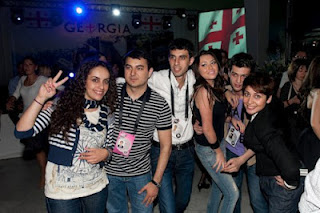The Eurovision Song Contest has hit the headlines again.
This time it’s serious. Austerity in Europe is apparently forcing countries to
withdraw. Could this be the end of Eurovision as we know it?
Last weekend it was reported that Poland and Portugal have withdrawn from the 2013 Contest due to the ongoing economic crisis. True,
the recession has had an impact on national broadcasters across Europe, however,
is it really all down to economics? Money
is an obvious issue since participation itself in the competition is an
expensive business let alone winning and hosting the event. Poland withdrew in 2012 since the national broadcaster TVP were concentrating on Euro 2012. However the
economic crisis has not deterred all of Europe’s most cash-strapped countries, Greece
being one example. There are other issues at play here.
Crippled financially by spiralling debts, Greece have
continued to appear at Eurovision (and qualify to the final) every year. Greek
participation in the event is paid for through private sponsorship – the record
company picked up the bill in 2012 and not the public. Eurovision is one of the
biggest shows of the year in Greece – participation in the event is almost a
matter of national pride. This is also true of Estonia which faced with
possible withdrawal in 2010. Enterprise Estonia, a government agency
responsible for promoting Estonian interests abroad, stepped in and paid for
the country to appear on the Eurovision stage. To some countries Eurovision is
more than a song contest; it is an opportunity to promote themselves
internationally, an opportunity that we take for granted in the UK.
Why didn’t Poland and Portugal follow the same
blueprint then and get private enterprise to pay the bill? Could it be that
their ratings were down which perhaps prompted this action? Poland’s best
placing was 2nd in 1994 and Portugal has never made the top 5
despite entering since 1964! Poland and Portugal aren’t the only countries to
have withdrawn recently though. The Czech Republic, Andorra and Monaco have all
walked away from the Eurovision stage in recent years. Again, given the
financial climate in Europe this is perhaps unsurprising. However these are
also countries that consistently failed to qualify from the semi finals. When
there isn’t much of a new story, the viewers tend not to follow.
In the summer of 2012 it was reported that the BBC
spent £350,000 on entering Eurovision. This might seem like a lot but in the
context of primetime television broadcasting this is not a gigantic sum, it is
all relative. One hour of Dr Who or Strictly easily runs into the millions. For
its £350,000 the BBC got over seven and a half hours of live, primetime
television and some of its largest audience shares of the year.
In terms of staging Eurovision, of course it is an
expensive programme (costing in excess of £25 million). In 2010 Norwegian
broadcaster NRK forfeited their rights to the World Cup in order for them to
host Eurovision. In 2001 the Estonian government stepped in to guarantee
funding for the 2002 contest in Tallinn after it was reported that the country
was “too poor to host Eurovision”. Ireland’s RTE were rumoured to have faced
difficulties in the 1990s after winning and staging four out of five contests
and yet they did it, and they did it well. Why? Good old fashioned national
pride. This is not something that will just totally diminish in a recession. In
fact that resolve might even be strengthened as Greek tenacity exemplifies.
Eurovision is undoubtedly changing. Gone are the days
of lavish parties and massive LED stages ala Moscow 2009. The Swedes are
working on a more streamlined format, back to basics. It is first and foremost
a television show. The contest in 2013 is unlikely to rival Azerbaijan’s show
in 2012 or Moscow’s in 2009. In the past countries have tried to beat the
previous host and produce ever more lavish contests. In the current economic
climate this is simply not sustainable. Eurovision will however, ride out this
storm, as it has every storm since 1956. It continues to draw in viewers and
capture the public imagination like no other format. People love it or they
hate it. There is no apathy when it comes to Eurovision and that is what is
really powerful. It is unlikely that formats such as X Factor will still be
around in 50 years. Surely we need Eurovision just now as much as we did in 1956? It unites us like nothing else and given the scale and the severity of the economic crisis in Europe, the contest provides us with some much needed light relief. Recession or no recession Eurovision will endure.


